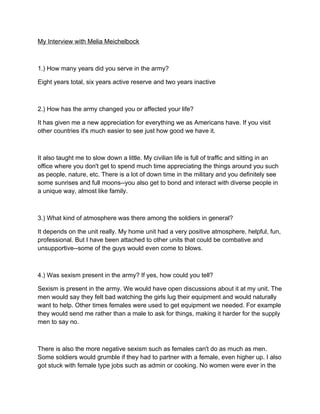
My interview with melia meichelbock
- 1. My Interview with Melia Meichelbock 1.) How many years did you serve in the army? Eight years total, six years active reserve and two years inactive 2.) How has the army changed you or affected your life? It has given me a new appreciation for everything we as Americans have. If you visit other countries it's much easier to see just how good we have it. It also taught me to slow down a little. My civilian life is full of traffic and sitting in an office where you don't get to spend much time appreciating the things around you such as people, nature, etc. There is a lot of down time in the military and you definitely see some sunrises and full moons--you also get to bond and interact with diverse people in a unique way, almost like family. 3.) What kind of atmosphere was there among the soldiers in general? It depends on the unit really. My home unit had a very positive atmosphere, helpful, fun, professional. But I have been attached to other units that could be combative and unsupportive--some of the guys would even come to blows. 4.) Was sexism present in the army? If yes, how could you tell? Sexism is present in the army. We would have open discussions about it at my unit. The men would say they felt bad watching the girls lug their equipment and would naturally want to help. Other times females were used to get equipment we needed. For example they would send me rather than a male to ask for things, making it harder for the supply men to say no. There is also the more negative sexism such as females can't do as much as men. Some soldiers would grumble if they had to partner with a female, even higher up. I also got stuck with female type jobs such as admin or cooking. No women were ever in the
- 2. S3 which is the operational strategy group. Same with missions, mostly the men got them--not the women. 5.) What are some examples of sexism you experienced in the army? Some mentioned above, I've also been told I smell nice and other things I'm sure they wouldn't say to a male. Some photos were taken with my underwear in Iraq, they would say gross stuff, but you learn to have thick skin or drive yourself nuts. In Iraq, I was very frustrated because the lower enlisted men in my unit got better accommodations than me as a superior. They stuck all the girls together in one giant room of 60 and the boys got private accommodations with groups of 2-3. The men also got to go on missions and they wouldn't let me go sometimes because it was deemed dangerous. I never understood why my life would be more valuable as a woman with no kids at the time, then a father of five. But they chose to send him instead. I spoke to my leaders about it and they said it's also the way that society and the media react when a woman is killed rather than a man. They have to consider that. So it's really not just the military, we're all guilty of putting women on a higher pedestal. 6.) How do you feel sexism in the army can be prevented? Leadership is top down. If the higher ups don't allow it--it won't happen. In the military you follow orders. Unfortunately there are some backwards leaders. But I think there is sexism everywhere, even outside the military. I do think the military tries to prevent it, but it's sort of depends on the way the men are raised. I think having more open discussion about it would help. I don't think men would understand why we get offended if they go for a bag or tell us we smell nice. I thought the one time open dialogue we had was very helpful in understanding both sides. 7.) What kind of training did you receive that prepared you for the army? Basic training, advanced training, drill training, annual training, pre-deployment training-- there is always training going on. These consisted of weapons training, cultural classes, sexual harassment, law classes, operational, etc.
- 3. 8.) How would you describe the war zone? It depended where you were. The big bases are like small cities--they even have burger king and swimming pools, lots of girls. I was mostly on remote bases where I was one of maybe three girls, sometimes the only girl. You feel all eyes on you and it's a little intimidating. You walk in to eat and it feels like everything stops and all eyes are upon you. 9.) What was usually your job in the army? In Iraq, I was a gunner for our civil affairs team. We traveled from town to town meeting with leaders and helping to arrange to rebuild. At my home unit I was usually responsible for admin or the food. 10.) How were you treated by the Iraqi people? Most of the Iraqis I met were nice. They took awhile to warm up to you because they aren't used to speaking directly to girls. One translator refused to sit next to me, but by the end was giving me a hug. The interaction with the locals was positive for all. All in all it was one of those best of times--worst of times experiences. You wouldn't trade the experience for anything in the world, but wouldn't necessarily like to go back. There are several videos and photos you can view of Iraqis on Facebook if you want to get a better glimpse. The page is called In the Company of Soldiers